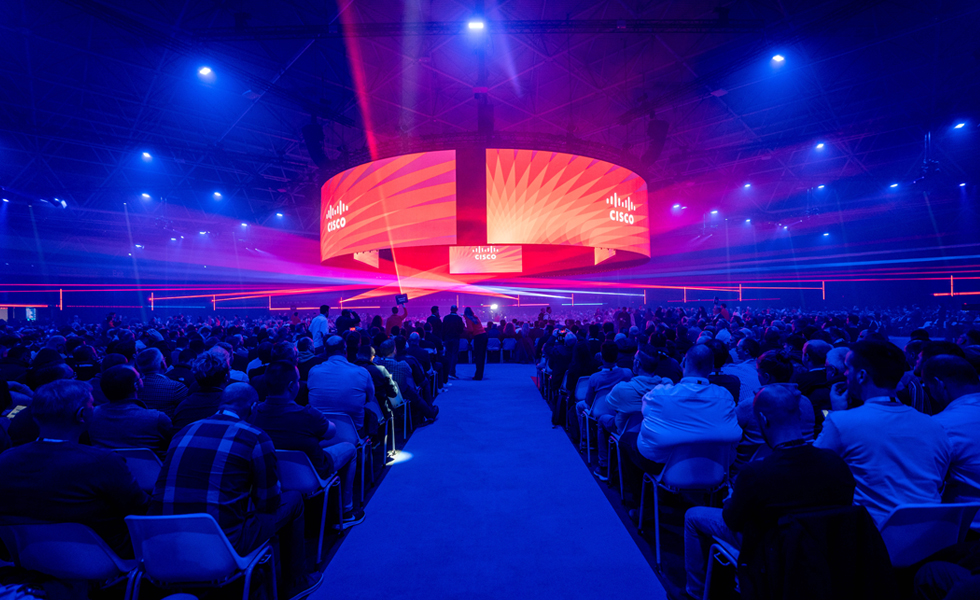In-person events are finally back, but much like companies have shifted to hybrid work, the event landscape now demands a hybrid approach. Enterprises must execute their events program with a strategy that combines both in-person and virtual elements. I led a session called ‘Centrally managed. Enterprise ready.’ during our flagship event, WebexOne, where we explored key challenges event professionals and IT teams face and how to solve them with the right event technology.
Flexible solutions that can pivot quickly
For one, event professionals understand event plans can change, and often do in an instant. An in-person event can quickly turn into a hybrid event overnight, while a planned hybrid event can become a virtual-only event in a matter of weeks.
Secure solutions
Event professionals and IT must also safeguard data and consider security, and compliance. Events involve critical proprietary data, including customer data from ticket purchases and password-protected information. Enterprises must ensure attendee data is managed by tested and vetted vendors, not companies that treat security as an afterthought.
Vendor consolidation
Of course, dealing with multiple vendors adds several complexities for IT governance, from integrating solutions that may not work together to increasing data silos, juggling multiple agreements, and increasing costs.
Discover how an all-in-one event platform seamlessly pivots between everything from small internal events to large conferences, while protecting sensitive data and simplifying procurement and management.
What an enterprise-ready solution looks like in practice: IT and admin perspectives
To start, let’s look at how an enterprise solution works in practice from the perspective of IT and event administrators.
IT perspective
With an enterprise-grade solution, provisioning event software to other teams in the organization is truly as simple as a click of a button. This is highly important because it frees up IT from being bogged down with overcomplicated, lengthy provisioning processes. It also enables IT to onboard various departments with minimal involvement. After provisioning the event on the backend and assigning roles, permissions, and varying levels of access, event admins can seamlessly create and customize their events.
While platform functionality and scalability prove crucial for enterprise IT teams, maintaining security and compliance are equally as important. Enterprise-ready solutions view transparency as the foundation of trust — not a feature — and will always be transparent when explaining how they go above and beyond industry standards to secure event data.
Enterprise platforms support regulatory compliance, such as ISO/IEC 27001, Star Level 1, GDPR, state privacy laws, and more, so IT teams can enjoy peace of mind. And because regulations constantly evolve, an enterprise software solution should stay on top of regulatory changes, saving your company from litigious risk.
Event professional perspective
Enterprise event managers want a tool that reduces the need to loop in IT each time they build and manage events. Even more, they want to be self-sufficient and feel empowered to create a digital-forward, secure events program with ease and speed on their own.
With a click of a button, an admin can change a hybrid event to a virtual event – no IT involvement needed. This flexibility becomes especially important in a post-pandemic world where uncertainty is still a factor and event formats can change in a moment’s notice.
When it comes to tool consolidation, an enterprise-ready platform is essential, eliminating the need for disparate tools and instead enabling event professionals to manage all stages of the event lifecycle from a single solution.
An enterprise event solution also helps event professionals manage access controls and permissions without sacrificing event security, for both internal and external stakeholders.
After IT designates admins within the enterprise software, admins can assign varying levels of access and permissions to individual departments and teams, enabling internal users to access the platform using their single sign-on credentials
For external events with dignitaries or executives, event admins can ensure security by making platform access invite-only or passcode-protected.
Enterprise software enhances event inclusivity
Inclusivity is paramount to events, especially with virtual attendees and global audiences. Enterprise event software comes equipped with features to make events inclusive for all attendees. Organizers can toggle on translations or multi-language closed captions for entire events, or at the session level. Combining these capabilities with enhanced streaming or RTMP allows for even more connectivity and extended reach.
Beyond simply offering these features, enterprise software allows event organizers to not only measure but define the success of their events. Analytics and live data dashboards are the heartbeat of an event, showing the content attendees consume, while polling, chat, and Q&A data reveal the sessions and speakers attendees find most engaging.
Event producers can leverage attendee comments, engagement metrics, and poll results to personalize the attendee experience and inform future content, or course-correct event experiences that fall flat with attendees. Additionally, data showing booth and landing page visits as well as engagements with sessions or promotions can prove ROI and show the value of events to internal stakeholders, sponsors, and exhibitors.
How Webex powers communication, collaboration, and engagement at Overhead Door Corporation
I spoke with Larry Freed, CIO, Overhead Door Corporation, during our session at WebexOne about their Webex story. Overhead Door Corporation extensively leverages Webex’s suite of fully integrated software to enhance communication, collaboration, and engagement for the enterprise’s events, training, and internal meetings, as well as customers and suppliers. The partnership helps the enterprise improve performance, increase productivity, and enhance operational efficiencies.
“People are our greatest assets. Webex helps us connect, build relationships, and recognize people for their contributions,” says Freed.
Streamlining event management for IT and event teams
Enterprises need a secure, centrally managed platform to streamline processes for both IT and event teams. No matter in-person, virtual, or hybrid, using a single tool for all lines of business reduces risk, promotes data privacy, and allows event professionals to seamlessly pivot between event formats.
At the heart of every event is a desire for connection, inclusivity, and engagement. With Webex Events, these core principles are built directly into our solution, encouraging engagement and fostering relationships at every event, no matter the size, format, or complexity. You can watch the full on-demand recording of my WebexOne session here.
Learn More:




